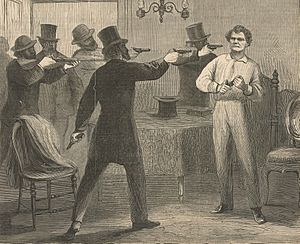George W. Ashburn facts for kids
Quick facts for kids
George W. Ashburn
|
|
|---|---|

"The Ku Klux Klan At Work -- The Assassination Of The Hon. G.W. Ashburn, In Columbus, Georgia."
|
|
| Born | 1814 North Carolina, United States
|
| Died | March 31, 1868 (aged 53–54) Columbus, Georgia, United States
|
| Occupation | Union Army colonel, judge |
| Political party | Radical Republican |
George W. Ashburn (1814 – March 30, 1868) was an important politician from the United States. He was a Radical Republican, which meant he strongly supported equal rights for African Americans. Sadly, he was killed by a group called the Ku Klux Klan in Columbus, Georgia. He was the first person the Klan murdered in Georgia.
Contents
Early Life and War Service
Ashburn was born in North Carolina in 1814. He moved to Georgia around 1830. He did not agree with Georgia leaving the United States before the American Civil War.
During the Civil War, Ashburn became a Colonel in the Union Army. After President Abraham Lincoln was killed in 1865, Ashburn wrote a letter. He felt Lincoln had not been strict enough with former Confederate leaders. Ashburn married Georgia Ryley in 1843, and they had one daughter.
Working for Change After the War
After the war ended, Ashburn went back to Columbus, Georgia. The military governor, George Meade, made him a judge. In this job, Ashburn worked to give voting rights back to all Georgians who had lost them.
Ashburn also helped organize the Georgia Constitutional Convention of 1867 in Atlanta. This meeting aimed to remove rules that stopped African Americans from having their rights after slavery ended. Ashburn wrote parts of the new Constitution that made sure Black people had civil rights.
Many white neighbors in Columbus called Ashburn a "scalawag". This was a negative term for white Southerners who supported the Union and Reconstruction. He worked with the Freedmen's Bureau, an agency that helped former enslaved people. He also worked with Black leaders like Henry McNeal Turner.
Ashburn's actions made him many enemies in the South. He lived among the African American community. This drew the attention of the Ku Klux Klan. The Klan started a chapter in Columbus on March 21, 1868, after a visit from Nathan Bedford Forrest.
Ashburn's Assassination
In 1868, Ashburn started an organization to help him get elected to the U.S. Senate. This was planned for after Georgia was allowed back into the Union. On the night of March 30, 1868, Ashburn attended a large meeting. Many Black people and Republicans were there at Temperance Hall in Columbus, Georgia. Henry McNeal Turner was one of the speakers.
Just after midnight, Ashburn was murdered. He was at a house on the corner of 13th Avenue and 2nd Street. A group of five men, who were well-dressed and wearing masks, killed him.
The Investigation and Trial
When Ashburn was murdered, Georgia was still under military rule. General George Meade, who won the Battle of Gettysburg, was in charge. As soon as he heard about the murder, General Meade took action. He put martial law in place in Columbus. This meant the military took control. He removed the mayor and ordered the immediate arrest of all suspects.
The trial began on June 29 and got national attention. More than twenty people were arrested. Most of them were important white residents of Columbus, Georgia. General Henry L. Benning and former Confederate Vice President Alexander Stephens agreed to defend those accused.
The U.S. government wanted Georgia to approve the Fourteenth Amendment. This amendment gave citizenship and equal rights to African Americans. The Georgia legislature was not agreeing to it. The people defending the Klan members saw a chance to make a deal.
On July 21, as the trial continued, Georgia agreed to approve the 14th Amendment. In return, General Meade ended the prosecution of the accused murderers. All the prisoners were released on bail and went back to Columbus. No one was ever punished for Ashburn's murder.
National Attention
Newspapers all over the United States wrote about Ashburn's murder and the trial. Those who supported the Klan in the South used these events to their advantage. They even published a book about the trial called Radical Rule: Military Outrage in Georgia.
See also
 | Kyle Baker |
 | Joseph Yoakum |
 | Laura Wheeler Waring |
 | Henry Ossawa Tanner |

